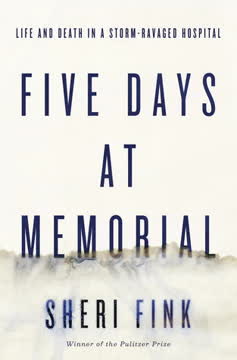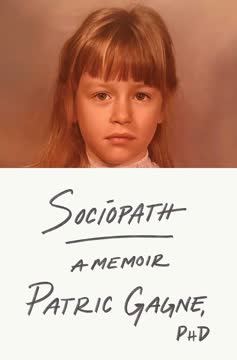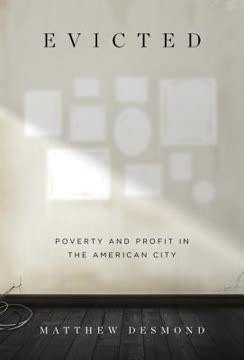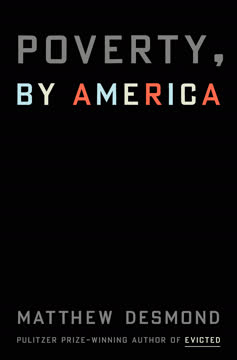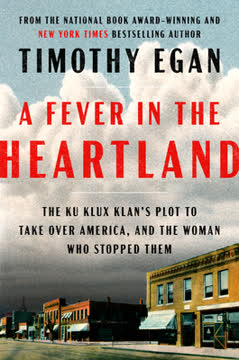Key Takeaways
1. Catastrophic Systemic Failure
"Not in all his years of practice had Thiele drilled for the loss of backup power, running water, and transportation. Life was about learning to solve problems by experience. If he had a flat tire, he knew how to fix it. If somebody had a pulmonary embolism, he knew how to treat it. There was little in his personal history or education that had prepared him for what he was seeing and doing now. He had no repertoire for this."
Profound unpreparedness. Memorial Medical Center, like much of New Orleans, was catastrophically unprepared for Hurricane Katrina's multi-faceted impact, despite years of warnings and disaster drills. The hospital's emergency plans, though extensive on paper, failed to anticipate the complete breakdown of essential services and infrastructure. This systemic failure left medical professionals without the basic tools and support needed to provide standard care.
Critical vulnerabilities. Key infrastructure, such as backup generators and electrical switches, was located below flood level, a known vulnerability that had been discussed and left unaddressed due to cost. When floodwaters rose, these systems failed, plunging the hospital into darkness and silence. The lack of functioning utilities meant:
- No air-conditioning in sweltering heat.
- No running water for sanitation or hydration.
- No working phones or communication systems.
- No operational elevators, hindering patient movement.
Governmental shortcomings. Beyond the hospital's internal failures, the broader governmental response was equally inadequate. Delayed evacuation orders, insufficient transportation, and uncoordinated rescue efforts left thousands stranded. This created a vacuum of authority and resources, forcing individuals within the hospital to make impossible choices without external support, exacerbating the crisis.
2. Ethical Collapse in Crisis
"It seemed to Thiele the laws of man and the normal standards of medicine no longer applied."
Breakdown of norms. As conditions at Memorial deteriorated, the established ethical and legal frameworks governing medical practice dissolved. Doctors and nurses, accustomed to a sterile, technologically advanced environment, found themselves stripped of their usual tools and protocols. This forced them into a "survival mode" where decisions were made under extreme duress, often contradicting conventional medical ethics.
Ad hoc decision-making. Without clear guidance or external support, medical professionals were compelled to improvise, leading to inconsistent and often agonizing choices. The absence of electricity, running water, and reliable communication meant that even basic patient care became a monumental challenge. This environment fostered a sense of isolation and desperation, where the immediate imperative of survival overshadowed long-term ethical considerations.
Moral injury. The experience inflicted profound moral injury on many staff members, who were forced to act in ways that conflicted with their professional oaths and personal values. The psychological toll of these decisions, made in a vacuum of accountability and under immense pressure, would haunt them for years. The crisis highlighted how easily the veneer of civilization and established ethics can crack under the weight of overwhelming disaster.
3. The Peril of Triage Decisions
"At a meeting Thiele had not attended, a small group of doctors had made this decision without consulting patients or their families, hoping to ensure that those with a greater chance of long-term survival were saved."
Controversial prioritization. Early in the crisis, Memorial's doctors made a critical, uncommunicated decision: patients with Do Not Resuscitate (DNR) orders, and later, the sickest patients (category 3), would be evacuated last. This reversed the standard practice of prioritizing the most critically ill, sparking confusion and distress among staff and families. The rationale was to save those with the "greatest chance of long-term survival," a utilitarian approach that clashed with individual patient advocacy.
Inconsistent application. The triage system itself was fluid and inconsistently applied, with categories shifting and decisions made without clear, universal criteria. This led to:
- Patients being moved, then returned, due to their DNR status.
- Able-bodied staff and family members being evacuated before critically ill patients.
- Confusion over who was "most salvageable" versus "least to lose."
Lack of consent. Crucially, these life-and-death triage decisions were made without the informed consent of patients or their families, violating a fundamental tenet of modern medical ethics. Families were often told their loved ones were being evacuated, only to discover later that they had been left behind or died. This lack of transparency and communication compounded the trauma for those left searching for answers.
4. Euthanasia Allegations Emerge
"I injected morphine into those patients who were dying and in agony. If the first dose was not enough, I gave a double dose. And at night I prayed to God to have mercy on my soul."
The "lethal cocktail." As the evacuation stalled and conditions worsened, allegations arose that Dr. Anna Pou and two nurses administered lethal doses of morphine and midazolam (Versed) to at least nine patients, primarily from the LifeCare unit. This drug combination, described by the Attorney General as a "lethal cocktail," was intended to hasten death, blurring the line between palliative care and active euthanasia.
Conflicting intentions. While some staff believed the injections were a compassionate act to relieve suffering in patients deemed "beyond emergency care," others viewed them as intentional killings. The distinction hinged on intent: was the goal to ease pain, even if it shortened life (double effect), or to directly cause death? The lack of documentation, patient consent, and the timing of the injections—as rescue efforts were finally intensifying—fueled suspicion.
Evidence and testimony. Forensic toxicology reports later confirmed the presence of high levels of morphine and midazolam in the bodies of several deceased patients, drugs not always prescribed for them. Eyewitness accounts from LifeCare staff described Dr. Pou and nurses preparing and administering these injections, with some recalling Pou stating that "lethal doses" would be given and that the patients "aren't going to survive."
5. Fear and Abandonment
"What would they do, these crazy black people who think they’ve been oppressed for all these years by white people … God knows what these crazy people outside are going to do to these poor patients who are dying. They can dismember them, they can rape them, they can torture them."
Pervasive terror. The hospital environment was steeped in fear, both from the deteriorating physical conditions and the pervasive rumors of lawlessness outside. Staff members, exhausted and isolated, genuinely feared for their safety and the safety of their patients. This fear, amplified by unreliable news reports and racial anxieties, significantly influenced decision-making.
Rumors and reality. Unsubstantiated reports of looting, violence, and even "zombies" roaming the streets contributed to a sense of impending chaos. These rumors, often racially charged, led to:
- Hospital entrances being barricaded.
- Armed staff patrolling the perimeter.
- Rescuers being turned away due to perceived threats.
- A general reluctance to leave the perceived "safety" of the hospital, even as conditions inside became unbearable.
Sense of abandonment. Many at Memorial felt utterly abandoned by external authorities, including government agencies and their own corporate headquarters. This feeling of being left to fend for themselves in a "war zone" contributed to a desperate mindset, where extraordinary measures seemed justifiable. The fear of what might happen if patients were left behind, coupled with the belief that rescue was not coming, created a fertile ground for extreme actions.
6. The Legal Reckoning
"This is not euthanasia. This is plain-and-simple homicide."
Arrests and charges. Months after Katrina, the Louisiana Attorney General's office launched an investigation into the deaths at Memorial. Based on eyewitness testimony and toxicology reports, Dr. Anna Pou and two nurses, Cheri Landry and Lori Budo, were arrested and charged with four counts of principal to second-degree murder. This ignited a national debate and brought the ethical dilemmas of disaster medicine into the legal spotlight.
Coroner's conflicting findings. The Orleans Parish coroner, Frank Minyard, initially declared no evidence of homicide, a decision that shocked investigators and was later contradicted by his own forensic experts. Minyard, influenced by public sentiment and political pressures, struggled to reconcile scientific evidence with community perceptions of heroism. His eventual testimony before the grand jury was perceived as ambivalent, further complicating the prosecution's case.
Grand jury's decision. Despite compelling evidence and expert opinions classifying many deaths as homicides, a special grand jury declined to indict Pou and the nurses on any charges. This outcome was influenced by:
- The perceived heroism of the medical staff.
- The chaotic and unprecedented circumstances of the disaster.
- The grand jury's limited exposure to all evidence and expert testimony.
- The defense's effective public relations campaign.
7. The "Code of Silence" and Public Opinion
"We’re not talking about it.… And by the way, nothing happened."
Community polarization. The arrests and subsequent grand jury decision deeply polarized the medical community and the public. Many rallied fiercely in defense of Pou and the nurses, viewing them as heroes unjustly persecuted. This created a "code of silence" within the hospital, where discussing the alleged events became taboo, and those who spoke out, like Dr. Bryant King, faced ostracization.
Media influence. The media played a significant role in shaping public perception, with sensationalized reports and emotionally charged interviews. Dr. Pou's appearance on "60 Minutes," where she tearfully denied being a murderer and spoke of "comfort care," garnered immense public sympathy. This narrative often overshadowed the complex ethical questions and the evidence presented by the prosecution.
Defense strategies. Pou's legal team mounted a "proactive defense," leveraging public opinion and political connections. They:
- Commissioned polls showing widespread public support for Pou.
- Orchestrated a robust public relations campaign, portraying her as a martyr.
- Argued that the state had abandoned the hospital, shifting blame to governmental failures.
- Lobbied for immunity laws for medical professionals in disasters.
8. Unresolved Ethical Dilemmas
"Who gave them the right to play God?"
The "duty to care" vs. "duty to die." The Memorial case starkly exposed the unresolved ethical dilemmas surrounding end-of-life care in disaster settings. The conflict between a physician's "duty to care" for all patients and the perceived necessity of making agonizing choices about who lives and dies, or who receives comfort versus life-sustaining treatment, remained deeply contentious. The question of "playing God" resonated profoundly with the public.
Lack of clear guidelines. At the time of Katrina, there were no clear, universally accepted guidelines for triage or end-of-life care in mass casualty events, particularly for prolonged, multi-system failures. This absence forced medical professionals to improvise, leading to inconsistent practices and profound moral distress. The case highlighted the urgent need for transparent, ethically sound protocols developed in advance of crises.
Patient autonomy compromised. The alleged injections, made without explicit patient consent or family consultation, raised fundamental questions about patient autonomy. Even in extreme circumstances, the right of individuals to make decisions about their own bodies and end-of-life care is paramount. The case underscored the danger of allowing medical professionals to unilaterally decide a patient's "quality of life" or "worth" in a crisis.
9. Lessons Unlearned (and Relearned)
"After everything that should have been learned about those horrific days in New Orleans, another hospital in a major American city now found itself without power, its staff fighting to keep alive their most desperately sick patients."
Recurring failures. Despite the profound lessons of Katrina, similar systemic failures and ethical dilemmas recurred in subsequent disasters, such as Superstorm Sandy in New York City. Hospitals in flood zones continued to have vulnerable infrastructure, and emergency plans often lacked comprehensive strategies for complete power loss or mass evacuations. This demonstrated a persistent national unpreparedness for large-scale medical crises.
New protocols, new challenges. In response to Katrina and fears of future pandemics, some states developed ventilator rationing protocols, aiming to provide transparent guidelines for allocating scarce resources. However, these protocols often faced:
- Lack of public awareness and input.
- Ethical concerns about withdrawing care from non-consenting patients.
- Evidence suggesting they might not accurately save more lives.
- Reluctance to implement them due to political and social backlash.
The human element remains. Ultimately, the book emphasizes that while systems and protocols are crucial, the immediate aftermath of a crisis often hinges on the individual decisions and actions of those on the scene. The ingenuity, resilience, and compassion of individuals, alongside their biases and fears, continue to shape outcomes. The ongoing challenge is to foster preparedness that supports ethical decision-making and maintains public trust, rather than simply codifying lower standards of care.
Last updated:
Review Summary
Five Days at Memorial received mixed reviews. Many praised Fink's extensive research and compelling storytelling, highlighting the ethical dilemmas faced by medical staff during Hurricane Katrina. Some found it thought-provoking and eye-opening, while others criticized its length and complexity. The book raised important questions about disaster preparedness, triage decisions, and end-of-life care. Some reviewers felt Fink's portrayal was biased, particularly regarding Dr. Pou. Overall, it was seen as a harrowing account of a tragic event that sparked debate about healthcare ethics in crisis situations.
Similar Books
Download PDF
Download EPUB
.epub digital book format is ideal for reading ebooks on phones, tablets, and e-readers.
